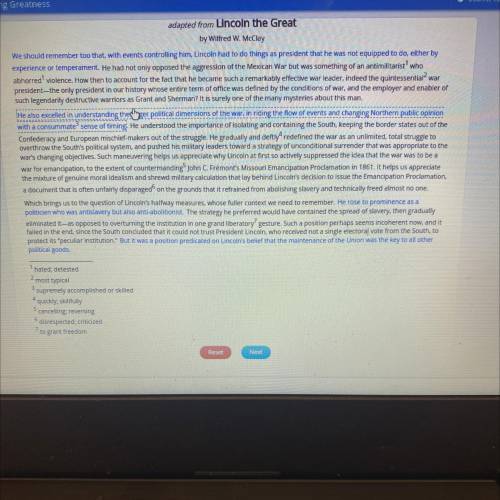Adapted from Lincoln the Great
by Wilfred W. McClay
We should remember too that, with events...

English, 20.10.2021 09:20, aaburto1515
Adapted from Lincoln the Great
by Wilfred W. McClay
We should remember too that, with events controlling him, Lincoln had to do things as president that he was not equipped to do, either by
experience or temperament. He had not only opposed the aggression of the Mexican War but was something of an antimilitarist' who
abhorred' violence. How then to account for the fact that he became such a remarkably effective war leader, indeed the quintessential war
president-the only president in our history whose entire term of office was defined by the conditions of war, and the employer and enabler of
such legendarily destructive warriors as Grant and Sherman? It is surely one of the many mysteries about this man.
He also excelled in understanding the larger political dimensions of the war, in riding the flow of events and changing Northern public opinion
with a consummate sense of timing. He understood the importance of isolating and containing the South, keeping the border states out of the
Confederacy and European mischief-makers out of the struggle. He gradually and deftly redefined the war as an unlimited, total struggle to
overthrow the South's political system, and pushed his military leaders toward a strategy of unconditional surrender that was appropriate to the
war's changing objectives. Such maneuvering helps us appreciate why Lincoln at first so actively suppressed the idea that the war was to be a
war for emancipation, to the extent of countermanding John C. Fremont's Missouri Emancipation Proclamation in 1861. It helps us appreciate
the mixture of genuine moral idealism and shrewd military calculation that lay behind Lincoln's decision to issue the Emancipation Proclamation,
a document that is often unfairly disparaged on the grounds that it refrained from abolishing slavery and technically freed almost no one.
Which brings us to the question of Lincoln's halfway measures, whose fuller context we need to remember. He rose to prominence as a
politician who was antislavery but also anti-abolitionist. The strategy he preferred would have contained the spread of slavery, then gradually
eliminated it-as opposed to overturning the institution in one grand liberatory' gesture. Such a position perhaps seems incoherent now, and it
failed in the end, since the South concluded that it could not trust President Lincoln, who received not a single electoral vote from the South, to
protect its "peculiar institution. But it was a position predicated on Lincoln's belief that the maintenance of the Union was the key to all other
political goods.
hated; detested
2 most typical
supremely accomplished or skilled
4 quickly, skillfully
5 cancelling reversing
disrespected, criticized


Answers: 2
Other questions on the subject: English

English, 21.06.2019 16:00, baseball1525
Read the excerpt from act i of the importance of being earnest. lane. i attribute it to the superior quality of the wine, sir. i have often observed that in married households the champagne is rarely of a first-rate brand. algernon. good heavens! is marriage so demoralising as that? this excerpt best illustrates which feature of a comedy of manners?
Answers: 1

English, 22.06.2019 04:30, kalebrayburn62
Read the passage. when mother’s fever persisted for a week, father summoned our family doctor. dr. blakemore applied leeches to mother’s skin in hopes of reducing the amount of blood in her body. despite the doctor’s efforts, she languished in bed for three more days before her appetite returned and she requested a thin broth. our dear cook, mrs. davis, prepared the broth and delivered it to my mother directly, eager to ease her discomfort. what can readers infer about the time period of the passage?
Answers: 1

English, 22.06.2019 06:00, angieboyd1pe3jme
According to what you heard, will the weather be nice enough for charlie and sophie's adventure on the sun and beach route in el salvador? yes no
Answers: 1

English, 22.06.2019 06:00, teresaswinger
Electronic cover letters are longer than traditional paper cover letters.
Answers: 3
Do you know the correct answer?
Questions in other subjects:

History, 20.06.2020 03:57


Biology, 20.06.2020 03:57

Mathematics, 20.06.2020 03:57


English, 20.06.2020 03:57

Chemistry, 20.06.2020 03:57


Health, 20.06.2020 03:57







